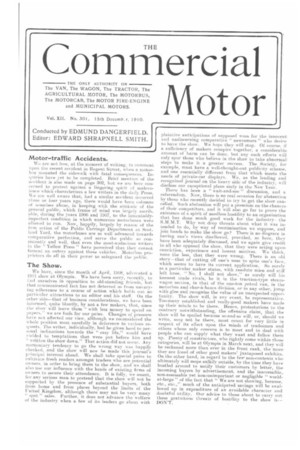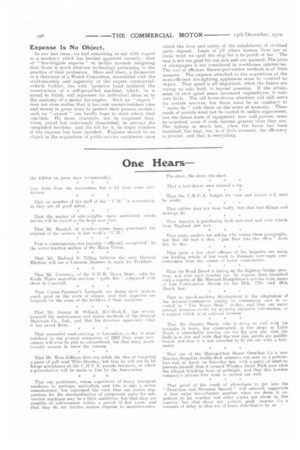Motor-traffic Accidents.
Page 1

Page 2

If you've noticed an error in this article please click here to report it so we can fix it.
We are not free, at the moment of writing, to comment upon the recent accident in Regent Street, when a motorbus mounted the sidewalk with fatal consequences. Inquiries have vet to be completed. Brief mention of the aceident is also made on page 302, but we are here concerned to protest against a lingering spirit ef malevolence which characterizes a few writers in the daily Press. We are well aware that, had a similar accident occurred three or four years ago, there would have been columns of senseless abuse, in keeping with the attitude of the general public, which frame of mind was largely ascribable, during the years 1906 and 1907, to the lamentablyimperfect condition in which numerous motorbuses were allowed to run. Now, happily, largely by reason of the firm action of the Public Carriage Department at Scotland Yard, the motorbuses are so well advanced towards comparative perfection' and serve the public so eonsistently and well, that even the most-audacious writers in the " Yellow Press " have perceived that they cannot foment an outcry against these vehicles. Motorbus proprietors do all in their over to safeguard the public.
The Show.
We have, since the month of April, 1908, advocated 1911 show at Olympia. We have been sorry, recently, to f;nd ourselves in Opposition to old-standing friends, but that communicated fact has not deterred us from unvarying adherence to a course of action which holds out no particular attractions to an editor and his staff. On the other side—that of business considerations, we have been informed, quite bluntly, by not a few makers, that, since the show will leave them " with less money to spend on papers." we are fools for our pains. Changes of pressure hove net affected our view, although we reconsidered the whole position most carefully in deference to various requests. The writer, individually, had lie given heed to personal inclinations towards the " easy life," would have yielded to temptations that were put before him and " written the show down." That action did not occur. Any momentary tendency to go the wrong way was happily checked, and the show will now he made this journal's principal interest ahead. We shall take special pains to cultivate fresh readers amongst traders who are potential owners, in order to bring them to the show, and we shall also use our influence with the heads of existing firms of owners to secure their attendance. It is folly, we assert, for any serious man to pretend that the show will not, be supported by the presence of substantial buyers, both from home and from places beyond the limits of the United Kingdom. although there may not be very many " spot " sales. Further, it does not advance the welfare of the industry when a few of its leaders go about with plaintive anticipations of supposed woes for the innocent and undiscerning comparative " newcomers " who desire to have the show. We hope they will stop. Of course, if a sufficiency of makers conspire together, a considerable amount of harm can he done, but any such efforts will only spur those who believe in the show to take abnormal; steps to make it a greater success. The Society, for example, must have a well-thought-out publicity scheme, and one essentially different from that which meets the needs of private-car displays. We, as the leading and recognized journal on the heavy side of the industry, will disclose our exceptional plans early in the New Year_ There has been a " wait-and-sec " discussion, and a referendum. Now, there is no real occasion for abstention• by those who recently decided to try to get the show cancelled. Such abstention will put a premium on the chances. of their competitors, and it will also go far to prove the existence of a spirit of needless hostility to an organization that has done much good work for the industrythe &MALT. Why not drop threats about what it, was intended to do, by way of recrimination we suppose, and join hands to make the show go ? There is no disgrace in having one's views disallowed, provided, as here, they have been adequately discussed, and we again give credit to all who opposed the show, that they were acting upon! conviction, experience and honest motives. We think, none the less, that they were wrong. There is an old story—that of cutting off one's nose to spite one's face,. which seems to have its current application. So surely as a particular maker states, with resolute mien and stiff left knee, " No. I shall not show," as surely will his keenest trade rivals, be it in the traction-type steamwagon section, in that of the one-ton petrol van, in the motorbus and char-k-bancs division, or in any other, jump with glee and recognize the value of an unexpected opportunity. The show will, in any event, be representative. Too-many established and really-good makers have made up their minds to be there. Hence, protestations to the contrary notwithstanding, the offensive claim, that the show will he spoiled because so-and-so will, or, should we write, may not be there, must count for very little in respect of its effect upon the minds of tradesmen and others whose only concern is to meet and to deal with people who can supply what they want and follow them up. Plenty of constructors, who rightly come within those categories, will be at Olympia in March next, and they will be reckoned more than ever in the front rank, the more. they are freed of other good makers' juxtaposed exhibits. On the other hand, in regard to the few non-contents who ultimately will mope sulkily outside, by the time they have bustled around to notify their customers by letter, the incoming buyers by advertisement, and the inaccessible,. non-assessable yet non-unimportant or negligible " worldat-large'' of the fact that " We are not showing, because, etc., etc.," much of the anticipated savings will be swallowed up in expenditure of an avoidable character and doubtful utility. Our advice to those about to carry out these gratuitous threats of hostility to the show is-DON'T.
Expense Is No Object.
In our last issue, we had something to say with regard to a tendency which has becrime apparent recently—that of " fire-brigade experts" to incline towards imagining that there is much abstruse technology pertaining to the practice of their profession. Here and there, a firemaster or a chairman of a Watch Committee, dissatisfied with the craftsmanship and ingenuity of the expert commercialvehicle builder, has with 'prentice hand initiated the construction of a self-propelled machine, which, he is proud to think, will represent his individual ideas as to the anatomy of a motor fire-engine. Such an " expert does not even realize that it has cost master-builders time and money in great store to perfect their present models; such an " expert " can hardly hope to start where they conclude. He must, therefore, not be surprised that, when, proud but consciously dissatisfied, he surveys the completed machine—and the bill for it, he dimly wonders if the expense has been justified. Expense should be no object in the acquisition of public-service equipment upon
which the lives and safety of the inhabitants of civilized parts depend. Least of all where human lives are at stake must we spoil the ship for a ha'porth of tar. The hest is not too good for our sick and our maimed. The price of champagne is not considered in workhouse infirmaries_ The cost of efficient disease-prevention methods is of little moment. The expense attached to the acquisition of the most-efficient fire-fighting appliances must be counted no object. That speed is all important, when the flames are trying to take hold, is beyond question. If the attainment of such speed mean increased expenditure, it matters little. The old horse-drawn steamers will still serve for certain services, but there must be no tendency to make do " with them on the score of economy. Thousands of pounds must not be wasted in useless experiment, but the latest form of equipment, now well proven, must be acquired, even if costs become greater than they are_ The upkeep is much less, when the horse has been banished, but that, too, is of little moment: the efficiency is greater, and that is everything.




















